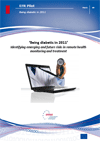 Since 2007, ENISA has been conducting a series of activities towards developing a comprehensive framework for identifying and assessing emerging and future risks (EFR). As a result of these activities, ENISA has constructed an EFR Framework. The EFR Framework is scenario-based and consists of certain phases for the formulation and analysis of scenarios, mobilisation of the necessary expertise (human resources) to assess and analyse the scenarios and leveraging of the management capabilities to collect and disseminate assessed information (e.g., scenario descriptions, threats, vulnerabilities, assets, impacts, risks, etc.).
Since 2007, ENISA has been conducting a series of activities towards developing a comprehensive framework for identifying and assessing emerging and future risks (EFR). As a result of these activities, ENISA has constructed an EFR Framework. The EFR Framework is scenario-based and consists of certain phases for the formulation and analysis of scenarios, mobilisation of the necessary expertise (human resources) to assess and analyse the scenarios and leveraging of the management capabilities to collect and disseminate assessed information (e.g., scenario descriptions, threats, vulnerabilities, assets, impacts, risks, etc.). The agency also sought to validate a European capacity for the evaluation of those risks to network and information security that may emerge in the near term, i.e. over the next three years. The work in this area is relatively new and, as such, calls for the interaction and co-operation of many leading experts from different disciplines, which is why ENISA established an EFR Stakeholder Forum and consulted with other subject matter experts. The EFR Stakeholder Forum, comprising partners and experts from industry, EU organisations and Member States, supports the agency in its deliberations on and assessment of EFRs and has contributed significantly to this pilot.
The pilot was undertaken in order to test and provide a "proof-of-concept" of the developed and proposed EFR Framework. It is based on a scenario in the area of remote health monitoring and treatment, an area which was selected after discussions with the EFR Stakeholder Forum. This report presents the results of the pilot exercise.
Download "Being diabetic in 2011" Identifying Emerging and Future Risks in Remote Health Monitoring and Treatment (.pdf 958 KB).
Download from the eHealthNews.EU Portal's mirror: "Being diabetic in 2011" Identifying Emerging and Future Risks in Remote Health Monitoring and Treatment (.pdf 958 KB).
For further information, please visit:
http://enisa.europa.eu